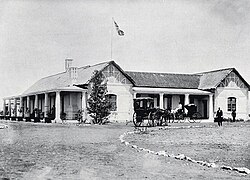State House, formerly called Government House, is a former Government House in Bulawayo, Zimbabwe. It was used by the British South Africa Company during their rule in Rhodesia. It was built by Cecil Rhodes in 1897 as his personal residence.[1][2] It is now used as the official Bulawayo residence for the President of Zimbabwe.[3]
| State House | |
|---|---|
 Government House under BSAC rule (1899) | |
| Former names | Government House |
| General information | |
| Type | Official residence |
| Architectural style | Cape Dutch |
| Town or city | Bulawayo |
| Country | Zimbabwe |
| Completed | 1897 |
| Renovated | 2018 |
| Owner | Government of Zimbabwe |
| Design and construction | |
| Architect(s) | Cecil Rhodes |
History
editThe ground which Government House was built on was formerly the site of a kraal where Lobengula, King of the Northern Ndebele people won a battle.[1] When it was built by Cecil Rhodes, it was one of the first permanent British buildings constructed in Rhodesia.[4] The garden contained a large tree under which Rhodes and Lobengula negotiated treaties.[5] It was intended to be Rhodes' personal residence and was designed based on Groote Schuur in Cape Town in the Cape Colony.[6]
Following Southern Rhodesia gaining responsible government, it became a British government property. In 1964, the British Prime Minister Harold Wilson met Joshua Nkomo of the then banned Zimbabwe African People's Union there to discuss Southern Rhodesian independence under black rule against the wishes of the Prime Minister of Southern Rhodesia Ian Smith.[7] When Smith declared Rhodesia an independent country unilaterally under minority rule, it became an official residence of the Prime Minister of Rhodesia and was the location of Smith's last official public engagement as Prime Minister before the establishment of Zimbabwe Rhodesia.[5]
Following the establishment of Zimbabwe in 1980, the Prime Minister Robert Mugabe demanded it be renamed State House alongside Government House in Salisbury.[8] It was left in a state of disrepair by 2011 due to Mugabe rarely using it when in Bulawayo.[9] Reportedly it was so bad, even the toilets were broken.[10] Despite this, it has still been used to host state events.[11] In 2018, the new President Emmerson Mnangagwa announced he would be renovating the State House to restore it after the neglect under Mugabe.[10]
References
edit- ^ a b "Bulawayo – Zimbabwe". Britannica. Retrieved 19 January 2021.
- ^ Msindo, Enocent (2012). Ethnicity in Zimbabwe. University of Rochester Press. p. 136. ISBN 9781580464185.
- ^ Murray, Paul (2016). Zimbabwe. Brandt Travel Guide. p. 300. ISBN 9781784770167.
- ^ "Rhodesia". Britishempire.co.uk. Retrieved 19 January 2021.
- ^ a b Smith, Ian (2001). Bitter Harvest: The Great Betrayal. Blake Publishing. pp. 302–303. ISBN 1903402050.
- ^ United States National Museum (1906). Report Upon the Condition and Progress of the U.S. National Museum During the Year Ending June 30, 1905. Smithsonian. p. 287. ISBN 9781332438037.
- ^ "Africans demonstrate as Wilson sees leaders". The Courier-Journal. 28 October 1965. Retrieved 19 January 2021 – via Newspapers.com.
- ^ "Sub-Saharan Africa Report". No. 2329–2332. Foreign Broadcast Information Service. p. 203.
{{cite magazine}}: Cite magazine requires|magazine=(help) - ^ "Bulawayo State House lies idle". Zimbabwe Independent. 1 December 2011. Retrieved 19 January 2021 – via All Africa.
- ^ a b "Bulawayo State House under major renovations". Bulawayo24 News. Retrieved 19 January 2021.
- ^ "Peace Commission Shocked After Mnangagwa Snub In Gukurahundi Reburials". New Zimbabwe. 6 December 2020. Retrieved 19 January 2021.